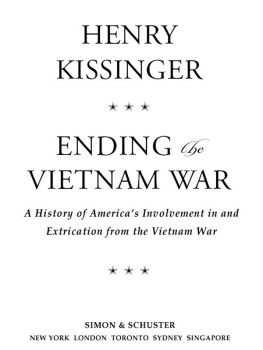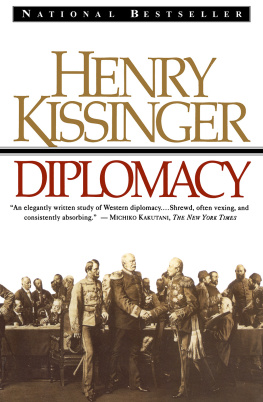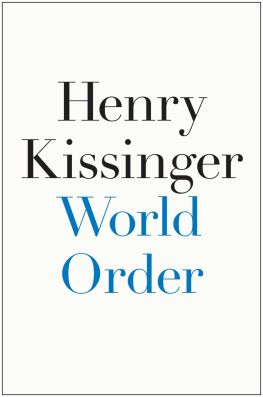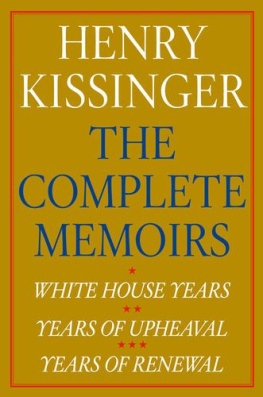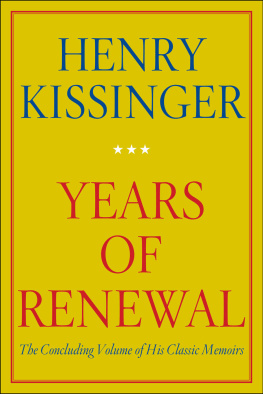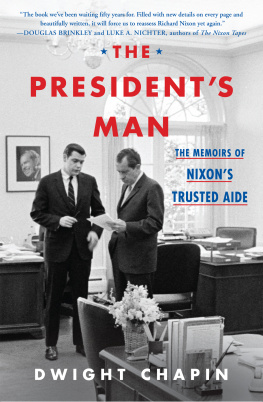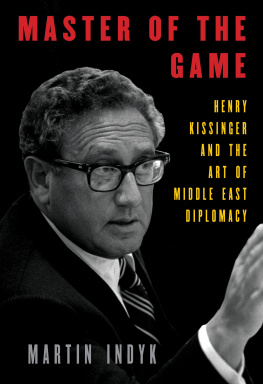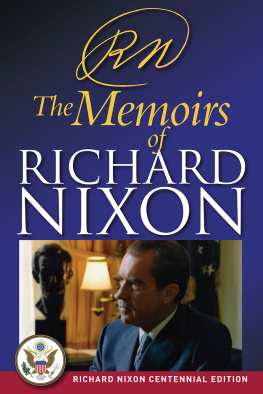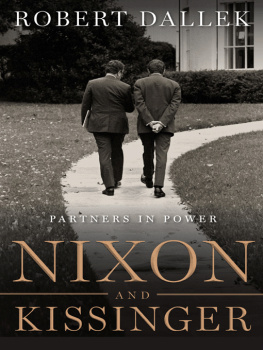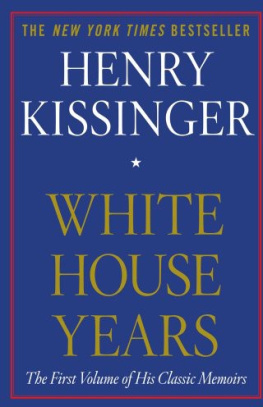Books by Henry Kissinger
Crisis: The Anatomy of Two Major Foreign Policy Crises
Ending the Vietnam War: A History of Americas Involvement in and Extrication from the Vietnam War
Does America Need a Foreign Policy?
Toward a Diplomacy for the 21st Century
Years of Renewal
Diplomacy
Observations: Selected Speeches and Essays, 19821984
Years of Upheaval
For the Record: Selected Statements, 19771980
White House Years
American Foreign Policy: Three Essays
Problems of National Strategy: A Book of Readings (editor)
The Troubled Partnership: A Reappraisal of the Atlantic Alliance
The Necessity of Choice: Prospects of American Foreign Policy
Nuclear Weapons and Foreign Policy
A World Restored: Metternich, Castlereagh, and the Problems of Peace: 181222


Simon & Schuster Paperbacks
A Division of Simon & Schuster, Inc.
1230 Avenue of the Americas
New York, NY 10020
www.simonsandschuster.com
Copyright 1982 by Henry A. Kissinger
Originally published by Little Brown & Company
All rights reserved, including the right to reproduce this book or portions thereof in any form whatsoever. For information, address Simon & Schuster Paperbacks Subsidiary Rights Department, 1230 Avenue of the Americas, New York, NY 10020
First Simon & Schuster trade paperback edition May 2011
SIMON & SCHUSTER PAPERBACKS and colophon are registered trademarks of Simon & Schuster, Inc.
The Simon & Schuster Speakers Bureau can bring authors to your live event. For more information or to book an event, contact the Simon & Schuster Speakers Bureau at 1-866-248-3049 or visit our website at www.simonspeakers.com.
Library of Congress Catalog Card No. 81-86320
ISBN 978-1-4516-3645-1
ISBN 978-1-4516-3647-5 (ebook)
The author is grateful to the following companies for permission to quote from selected material:
CBS Inc. for excerpts from A Conversation with Henry Kissinger CBS Inc. 1973/74. All rights reserved. Originally broadcast February 1, 1973, over the CBS Television Network as part of the CBS News Special Report: A Conversation with Henry Kissinger/ The CBS Evening News with Walter Cronkite /over the CBS Radio Network on First Line Report on June 4, 1974.
Foreign Service Journal for excerpts from U.S. Covert Actions in Chile, 19711973. December 1978.
NBC News for excerpts from Meet the Press aired on January 28, 1973, and April 1, 1973.
Newsweek for excerpts from A Prisoner of Rhetoric March 26, 1973, Copyright 1973 by Newsweek, Inc. All rights reserved. Reprinted by permission.
The New York Times for excerpts 1972, 1973, 1974, by The New York Times Company. Reprinted by permission.
United Feature Syndicate, Inc., for excerpts from columns by Jack Anderson 1972 United Feature Syndicate, Inc.
Universal Press Syndicate for excerpts from The Price of Change by William F. Buckley, Jr. Copyright 1980 Universal Press Syndicate. Reprinted with permission. All rights reserved.
Excerpts from White House Years by Henry Kissinger (1979) courtesy of Little, Brown and Company.
The author is also grateful to the Daily Telegraph, the Chicago Tribune, The Times (London), and the Washington Post.
The maps on are based on maps by Carta, Jerusalem, used in Chaim Herzog, The War of Atonement: October 1973 (London: George Weidenfeld & Nicolson Ltd., 1975; Boston: Little, Brown and Company, 1975).
To Nancy
Contents
List of Illustrations
The June 1974 Nixon-Brezhnev Summit:
List of Maps
Foreword
A STRANGE combination of circumstances caused me to be entrusted with the day-to-day conduct of our nations foreign policy during Richard Nixons second term a time of upheaval without precedent in this century. A President fresh from the second largest electoral victory in our history was unseated in a revolution that his own actions had triggered and his conduct could not quell. And amid the disintegration of the Nixon Presidency there occurred an explosion in the Middle East, disputes with our allies, an energy crisis, the unraveling of the Vietnam settlement, and a bitter domestic controversy over USSoviet relations. We had begun Nixons second term imagining that we were on the threshold of a creative new era in international affairs; seldom, if ever, had so many elements of foreign policy appeared malleable simultaneously. Within months we confronted a nightmarish collapse of authority at home and a desperate struggle to keep foreign adversaries from transforming it into an assault on our nations security and that of other free peoples.
Nixons first term (19691973) the subject of my earlier volume, White House Years was in a sense an adolescence. Amid turmoil over Indochina, the Administration was able to dominate events and help shape a new international structure of relations among the superpowers. Diplomacy in the second term, which ended abruptly in the late summer of 1974, was a rude accession of maturity. A weakened executive authority magnified the difficulty of every challenge even while the world afforded no respite from Americas responsibilities as the leader and protector of the democracies.
Watergate had a severe impact on the conduct of diplomacy in almost all its dimensions, providing an object lesson, if one was needed, in how crucial a strong President is for the design and execution of a creative foreign policy. Yet through it all we managed to preserve the basic design of our foreign policy and even scored some important successes. American diplomacy in the Middle East during and following the October 1973 war contributed to a peace process that has continued, with great advances and some setbacks, to this day. And we laid the basis for mastering the energy crisis. It was an extraordinary period of testing, but statesmen do not have the right to ask to serve only in simple times.
During the years covered in this volume, my own perspective changed, and not only because of our domestic upheaval. On September 22, 1973, I became Secretary of State, having served for Nixons first four and a half years in the White House as Assistant to the President for National Security Affairs. As Secretary of State I was responsible for a much broader range of problems than as the national security adviser, who has the luxury of selecting those issues that seem of paramount importance. Most important, it fell to me to attempt to insulate foreign policy as much as possible from the domestic catastrophe. This role, imposed by necessity and by a seeming national instinct for survival, was buttressed in many fields by a bipartisan consensus that created almost a separate protected political process for the international conduct of the American government.
In describing the foreign policy of the period of Nixons fall, the task of the memorialist is even more complex than usual. Intangibles of motivation and mood are more elusive still than with respect to the previous period. Inevitably what I have set down reflects my own vantage point; it is an account of my perceptions and convictions, which will have to be assessed in relation to what others thought and felt and what light documents unavailable to my researchers and me many of them in foreign archives will in time throw on the subjects discussed here. I intend to leave an annotated copy of this volume with my papers for the use of scholars who may someday wish to pursue the period in greater detail. This memoir is a description of how the issues appeared to one of the participants shaping the decisions. I have made a major and I hope conscientious effort to document my assertions.
Next page
![Kissinger Years of Upheaval: [VOL2 Classic Memoirs]](/uploads/posts/book/181244/thumbs/kissinger-years-of-upheaval-vol2-classic.jpg)
